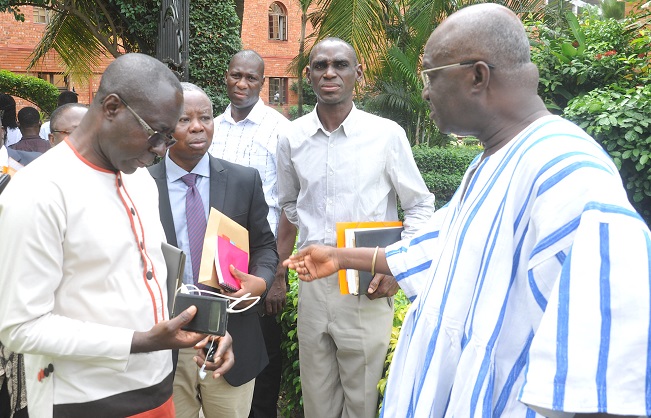
Ministry of Sanitation and Water Resources launches scheme for private sector actors
The Ministry of Sanitation and Water Resources has launched a $225,000 award scheme to reward private sector actors who will support finalists in a National Sanitation Challenge programme to successfully implement their liquid waste management strategy proposals.
Advertisement
The National Sanitation Challenge is a competition among metropolitan, municipal and district assemblies (MMDAs) requiring them to design and implement liquid waste management strategies.
The ministry, in collaboration with its partners, sourced funding from the Bill and Melinda Gates Foundation for the awards scheme which is code-named: “The Community and Water Sanitation Agency - Bill and Melinda Gates Foundation prize (CWSA-BMGF prize).”
The National Sanitation Challenge is currently in its final stage, which is also the implementing stage, where the 17 finalists are expected to execute their liquid waste management strategies after which successful applicants would be rewarded.
The challenge started from June 2016 and would end in December 2018 when the ultimate winner will receive the Dignified City Award and cash prize of #GBP1.285 million.
Sanitation challenge
The National Sanitation Challenge which was introduced in 2015 has been described by stakeholders as one of the biggest national interventions aimed at improving sanitation. The focus of the competition is to achieve effective management of liquid waste.
The competition, which is in its second stage, required 139 MMDAs with populations exceeding 15,000 inhabitants, according to the 2010 National Population Census, to submit their liquid waste management strategies for consideration, of which only 48 did.
Out of the 48 MMDAs that presented their strategies for stage one, 21 had their strategies selected, having met the requirements.
Three out of the 21 selected winners for stage one received monetary awards with the other 18 MMDAs receiving honorary awards.
Out of the 21 awardees, 17 qualified to enter the second and final stage of the competition, the implementation stage.
The awards were financed by the UK Department for International Development (DFID) and was dubbed ‘the Sanitation Challenge’.
The initiative is aimed at promoting competition among MMDAs and also encouraging them to team up with innovators, problem solvers and the citizenry to design and implement liquid waste management strategies to transform and improve the lives of the poor people in the country’s urban centres.
The lead government institution with overall responsibility for the challenge is the Ministry of Local Government and Rural Development (MLGRD).
Objectives
The programme is aimed at making urban sanitation a political matter of great importance for chief executives of MMDAs and core management of the assemblies.
It is also expected that leadership will ensure that sustainable sanitation services are available and affordable for people living in urban areas through innovative approaches that will transform and significantly improve delivery of sanitation services.
In addition, MMDAs are supposed to prioritise the use of existing public funding in support of sanitation while mobilising external and private donor funding for the benefit of the urban poor, particularly with regard to household sanitation services and businesses.
Launch
At the launch of the scheme in Accra yesterday the 17 finalists were brought together to share experiences and to learn from one another.
The Sector Minister, Mr Kofi Adda, reminded MMDAs that managing liquid waste in their respective localities was their sole responsibility.
“We will forge partnerships to generate the needed resources to scale this initiative across all the 216 MMDAs. This is to make sanitation and the President’s vision of toilet for all a reality,” he said.
The Head of Local Government Service, Nana Ato Arthur, said the competition was a strategy to help deal with the problem of sanitation.
He appealed to the finalists, as part of the implementation stage, to undertake the construction of household toilets for the poor, put up institutional and public toilets to reduce open defecation in their various communities.
The stage two of the competition will seek to reward the assembly that comes up with a strategy that is well implemented and effective and will make the required impact.




